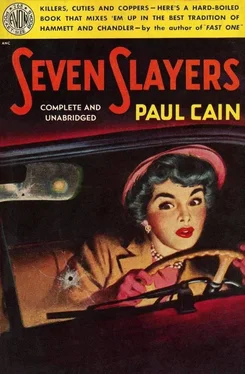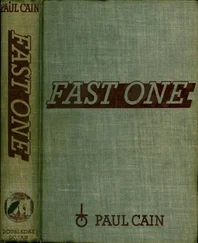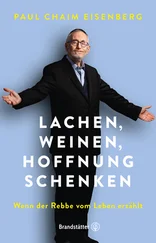Doolin lighted another match and picked up his revolver, his hat. He took out a handkerchief and wiped his face and the handkerchief was wet, dark. He walked, unsteadily to the door, down the dark stairs.
One faint globe burned above the deserted bar. Doolin felt his way along the wall, lifted the heavy bar across the outside door and went out, closed the door behind him. It was raining lightly, a thin cold drizzle.
He took air into his lungs in great gulps, soaked the handkerchief in a little puddle of rainwater and tried to clean his face. Then he went down the dark street swiftly towards Broadway.
The druggist looked at him through thick spectacles, gestured towards the back of the store.
Doolin said: “Fix me up some peroxide an’ bandages an’ stuff — I had an accident.” He went back to the telephone booth, found the number of the Fontenoy, called it, asked for Mrs. Sare.
The operator said Mrs. Sare didn’t answer.
Doolin hung up and went out and cleaned the blood from his face in front of a mirror. A little girl stared at him wide-eyed from the soda fountain; the druggist said: “Automobile...?”
Doolin nodded.
The druggist asked: “How much bandage do you want?”
Doolin said: “Let it go — it’s not as bad as I thought it was.”
He put his hat on the back of his head and went out and got into a cab, said: “Fontenoy Apartments — Hollywood. An’ make it snappy.”
Lola Sare’s voice said: “Yes,” with rising inflection.
Doolin opened the door, went in.
She was sitting in a long low chair beneath a crimson-shaded bridge lamp. It was the only light in the room. Her arms were bare, straight on the arms of the chair, her hands hanging limply downward. Her dark head was against the back of the chair and her face was taut, her eyes wide, vacant.
Doolin took off his hat, said: “Why the hell don’t you answer your phone?”
She did not speak, nor move.
“You’d better get out of here — quick.” Doolin went towards her. “Halloran killed Martinelli — an’ Martinelli opened up about you before he died. Halloran will be coming to see you...”
Her blank eyes moved slowly from his face to some place in the dusk behind him. He followed her gaze, turned slowly.
Halloran was standing against the wall near the door. The door had covered him when Doolin entered; he put out one hand and pushed it gently, it swung closed with a sharp dick.
As Doolin’s eyes became used to the dimness of the room he saw Halloran clearly. He was leaning against the wall and the right shoulder and breast of his light gray suit was dark, sodden. He held the short blunt Luger in his left hand.
He said: “You’re a little late...”
The Luger roared.
Lola Sare put her hands up to the middle of her breast, low; her head came forward slowly. She started to get up and the Luger leaped in Halloran’s hand, roared again.
At the same instant Doolin shot, holding the revolver low. The two explosions were simultaneous, thundered in the dark and narrow room.
Halloran fell as a tree falls; slowly, stiffly, his arm stiff at his sides; crashed to the floor.
Doolin dropped the revolver, walked unsteadily towards Lola Sare. His knees buckled suddenly and he sank forward, down.
There was someone pounding at the door.
Doolin finished dabbing iodine on his head, washed his hands and went into the little living room of his apartment. A first dull streak of morning grayed the windows. He pulled down the shades and went into the kitchenette, lighted the gas under the percolator.
When the coffee was hot he poured a cup, dropped four lumps of sugar into it absently, carried it into the living room. He sat down on the davenport and put the coffee on an end-table, picked up the phone and dialed a number.
He said: “Hello, Grace? Is Mollie there?...” He listened a moment, went on: “Oh — I thought she might be there. Sorry I woke you up...” He hung up, sipped his steaming coffee.
After a few minutes he picked up the phone, dialed again, said. “Listen, Grace — please put Mollie on... Aw nuts! I know she’s there — please make her talk to me...”
Then he smiled, waited a moment, said: “Hello darling... Listen — please come on home — will you?... Aw listen, Honey — I did what you said — everything’s all right... Uh-huh... Halloran’s dead — an’ Martinelli... Uh-huh... The Sare dame is shot up pretty bad, but not too much to give evidence an’ clean it all up... Uh-huh...”
He reached over and picked up the cup and took a long drink of coffee, smiled into the phone, said: “Sure — I’m all right — I got a little scratch on my head but I’m all right... Sure... Sure — we were right... All right, Honey — I’ll be waiting for you. Hurry up... G’bye...”
He hung up, curved his mouth to a wide grin, finished his coffee, lit a cigarette and waited.
The woman was bent far forward over the steering-wheel of the open roadster. Her eyes, narrowed to long black-fringed slits, moved regularly down and up, from the glistening road ahead, to the small rear-view mirror above the windshield. The two circles of white light in the mirror grew steadily larger. She pressed the throttle slowly, steadily downward; there was no sound but the roar of the wind and the deep purr of the powerful engine.
There was a sudden sharp crack; a little frosted circle appeared on the windshield. The woman pressed the throttle to the floor. She was pale; her eyes were suddenly large and dark and afraid, her lips were pressed tightly together. The tires screeched on the wet pavement as the car roared around a long, shallow curve. The headlights of the pursuing car grew larger.
The second and third shots were wild, or buried themselves harmlessly in the body of the car; the fourth struck the left rear tire and the car swerved crazily, skidded halfway across the road. Very suddenly there was bright yellow light right ahead, at the side of the road. The woman jammed on the brakes, jerked the wheel hard over; the tires slid, screamed raggedly over the gravel in front of the gas station, the car stopped. The other car went by at seventy-five miles an hour. One last shot thudded into the back of the seat beside the woman and then the other car had disappeared into the darkness.
Two men ran out of the gas station. Another man stood in the doorway. The woman was leaning back straight in the seat and her eyes were very wide; she was breathing hard, unevenly.
One of the men put his hand on her shoulder, asked: “Are you all right, lady?”
She nodded.
The other man asked: “Hold-ups?” He was a short, middle-aged man and his eyes were bright, interested.
The woman opened her bag and took out a cigarette. She said shakily: “I guess so.” She pulled out the dashboard lighter, waited until it glowed red and held it to her cigarette.
The younger man was inspecting the back of the car. He said: “They punctured the tank. It’s a good thing you stopped — you couldn’t have gone much farther.”
“Yes — I guess it’s a very good thing I stopped,” she said, mechanically. She took a deep drag of her cigarette.
The other man said: “That’s the third hold-up out here this week.”
The woman spoke to the younger man. “Can you get me a cab?”
He said: “Sure.” Then he knelt beside the blown-out tire, said: “Look, Ed — they almost cut it in two.”
The man in the doorway called to her: “You want a cab, lady?”
She smiled, nodded, and the man disappeared into the gas station; he came back to the doorway in a minute, over to the car. “There’ll be a cab here in a little while, lady,” he said.
She thanked him.
“This is one of the worst stretches of road on Long Island — for highwaymen.” He leaned on the door of the car. “Did they try to nudge you off the road — or did they just start shooting?”
Читать дальше












